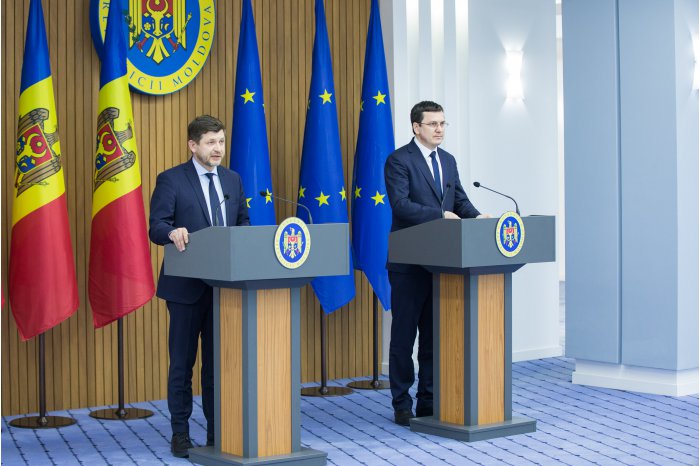More than 75 per cent of all international humanitarian assistance received by non-governmental organizations in Moldova
19:37 | 21.03.2022 Category: Official
Chisinau, 21 March /MOLDPRES/ - As many as 161 consignments of humanitarian assistance have entered Moldova since the beginning of the crisis of refugees from Ukraine, of which 114 are for non-commercial organizations and religious communities. The overall weight of the batches is of 1,250 tons, of which 220 tons were received by the central public authorities (17 per cent), 70 tons by local public authorities (APL) (5 per cent) and another 960 tons – NGOs, religious communities and international organizations. Thus, more than 75 per cent of all humanitarian aid came to the civil society and is managed by non-governmental organizations, the government’s communication and protocol department has reported.
The government’s secretary general, Dumitru Udrea, and Labour and Social Protection Minister Marcel Spatari presented data to this effect at a news conference today.
The government’s secretary general today said that, till 21 March, all donations in goods, including tents, food products, blankets, hygiene articles and other products for managing the crisis of refugees from Ukraine, was amounting to over 4.8 million euros, and was distributed as follows:
- 4.1 million euros – through the European Union’s Civil Protection Mechanism, donations managed by the General Inspectorate for Emergency Situations (IGSU), more exactly the centres of selection from the border crossing points;
- about 478,000 euros – food products and essential goods managed by the Labour and Social Protection Ministry through the central warehouse from Vatra;
- about 227,000 euros – medicines and medical devises, managed by the Health Ministry.
Dumitru Udrea noted that the Single Crisis Management Centre continued to distribute assistance to the placement centres and mayoralties from Moldova through the information platform worked out to this end (www.uahelp.md), as well as based on pre-established mechanism of receiving needs on behalf of mayoralties.
For his part, Marcel Spatari also said that, ‘’starting from 10 March, over 50 batches from the Vatra-based central warehouse were distributed to 20 districts and public institutions which authorized placement centres, with an overall value of over half a million lei. ‘’The transportation is provided by development partners and the warehouse is contracted by the Labour and Social Protection Ministry,’’ the official said.
The minister also informed about the simplification of the procedure of import of humanitarian assistance. While earlier, notifications by the National Food Safety Agency (ANSA) and National Public Health Agency has been necessary for imports to non-commercial organizations, now these notifications are not needed and the notification by the Labour and Social Protection Ministry is issued during one day. If the imports are meant to the competent ministries or the United Nations Refugee Agency, the Labour Ministry’s notification is not necessary. The consignments of humanitarian assistance which are not accompanied by documents are regarded as donations and are received at the warehouse from the Leuseni custom checkpoint and then carried to the Moldova-Film warehouse. Several batches were meant for the mayoralties from Moldova and they were redirected directly to the Rascani and Drochia districts the second day after reception.
To cover the expenses borne by APL of the first level, the Labour and Social Protection Ministry made available the email: [email protected], to which authorities can submit confirmatory documents (instructions on allocation of financial means, contracts on providing services, invoices of purchasing goods, products for refugees, etc.), so that the Ministry identifies solutions of financing for authorities.
The participants in the conference said that, starting from 22 March 2022, a single centre for the collection of products and assets donated by Moldova’s citizens for refugees from Ukraine will work in Chisinau. It will be placed at Moldova Film (Hancesti highway 61). The decision on ceasing the work of the other two centres (at the Technical University and the Railwaymen Palace) was taken while taking into account the substantial decrease in the assistance on behalf of residents.
The officials also said that most humanitarian assistance donated by residents had been distributed in the first weeks after the unleashing of the war in Ukraine and they essentially contributed to the covering of the needs of the initially opened placement centres.
„I want to inform you that, starting from 17 March, the Green Line 0 800 800 11 registered a double number of requests on behalf of Ukrainian refugees for the categories of goods and food. More exactly, on the period 17-20 March, 1,704 calls were received, most of which were requests for food products and essential goods,’’ Dumitru Udrea said.
The requests recorded by the Green Line’s operators are redirected to the team of volunteers, Moldova for Peace, which prepares the list of products and invites refugees to take over the packages. Also, the Single Crisis Management Centre informs about an extra possibility to ask for goods and food. The platform www.dopomoha.md, available in the Ukrainian, Romanian and Russian languages, was launched by the group of volunteers, Moldova for Peace. Refugees here are able to ask for help and volunteers will contact them to inform them when and where they can take the package of products.
There were 101,539 refugees from Ukraine, of whom 48,118 children, in Moldova today, 21 March, at 6:00. The number is decreasing against the data of late last week. No increased flow of entries has been registered at the points of crossing the border with Ukraine on the last days and the traffic is normal.
A number of 4,268 refugees are accommodated at those 104 placement centres from Moldova, of which 42 in Chisinau; most of them are women and children. Another 4,800 free places are available at these centres.
Photo: Government

